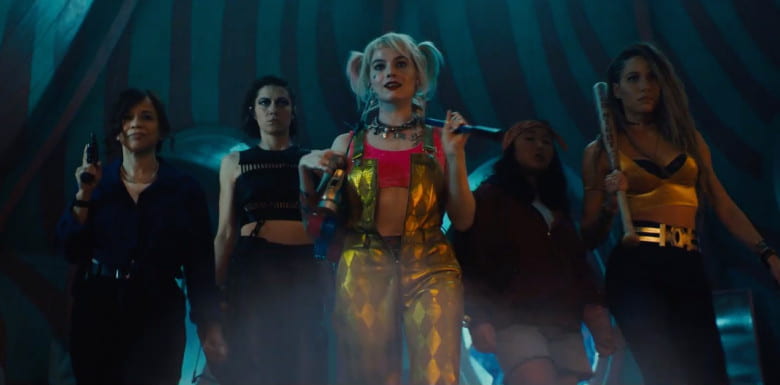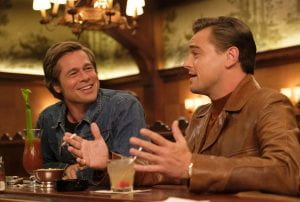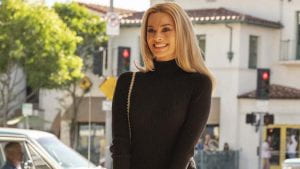“Godhood is just like girlhood: a begging to be believed” -Kristin Chang
“Always an angel, never a god” -boygenius
Continue reading “Review: Like Life in Plastic, ‘Barbie’ is Fantastic”
“Godhood is just like girlhood: a begging to be believed” -Kristin Chang
“Always an angel, never a god” -boygenius
Continue reading “Review: Like Life in Plastic, ‘Barbie’ is Fantastic”
The month of February is best known for movies that probably are a hit or miss depending on how good they delivered during the end of the winter season. Well, this year started out with the Birds of Prey (and the Fantabulous Emancipation of Harley Quinn). Cathy Yen’s Birds of Prey might prove to be Harley Quinn’s redemption from her recent portrayal in the disastrous Suicide Squad. Birds of Prey is directed by Cathy Yen and stars Margot Robbie, Mary Elizabeth Winstead, Rosie Perez, and Ewan McGregor. The plot centers around Harley Quinn (Robbie), who after splitting up with the Joker, must bring a priceless diamond to Roman Sionis (McGregor) from a thieving little girl, Cassandra Cain (Ella Jay Basco). Her attempt to bring the diamond back involves a lethal assassin, a singer/driver, and a detective as they clash in their attempts to collect the fortune.
Though everyone in this film had stellar character performances, Margot Robbie goes above and beyond. Harley Quinn’s character as a crazed but deadly protagonist never misses a beat as she pulls a combination of comedy and storytelling throughout the film. Even though that Harley Quinn’s character is limited in Suicide Squad, this film took almost four years to perfect the character of Harley Quinn, from everything including the way her dialogue switches between first and third-person perspective to her interactions with every other character on screen.
The most satisfying part of this film is its action choreography. Harley Quinn’s weapon tactics and maneuvers are on par with other action films from this past decade, like the John Wick movies. Each action scene is unique with alternating slow-motion and rapid-fire sequences that leave the audience in amusement and excitement. Each scene features a face-to-face confrontation that reveals a perfectly timed and well-executed action scene filled with dialogue and great cinematography.

However, this film has one major issue that keeps it from being a great DC film: the main antagonist, Roman Sionis (aka Black Mask). His character introduction is too rushed, especially considering that he’s supposed to be the main threat to Harley Quinn. His Black Mask persona doesn’t have any defining personality traits besides getting what he wants and kidnapping the Cassandra Cain (Ella Jay Basco). In contrast, when compared to his other appearances in Batman: Under the Red Hood, Batman: Bad Blood, and Suicide Squad: Hell to Pay, the character of Black Mask is a ruthless crime lord in Gotham City whose character is well developed.
Overall, Cathy Yen does a good job of directing Birds of Prey, since DC films are typically poorly received. The directing and writing are on par with films like John Wick and Deadpool. The multiple genres are pulled off surprisingly well and are well balanced. The actors deliver superior performances and all in all, and as a whole, this film definitely tops David Ayer’s Suicide Squad.
3/5 STARS
“Let me tell you something. There’s no nobility in podcasting.”
Happy New Year, Huskies! We hope you had a relaxing winter break and are ready to kick things back in gear this quarter. But despite the stress and dread that comes along with the start of winter quarter, also comes the start of awards season! Martin Scorsese’s The Irishman, though earning 5 nominations, was completely shut out of the Golden Globes. Whether that means a shut out from the Oscars remains to be seen, but in the meantime, we’ve decided to talk about another one of Scorsese’s recent gems – The Wolf of Wall Street! In this podcast, we discuss the film’s genius structure, debate whether or not it endorses the actions of Jordan Belfort, and Jim gives his hot takes on Scorsese and (in an unrelated note) the best Star Wars film. Let me give you some legal advice: listen to the 62nd episode of the UW Film Club Podcast now!
On this episode: Jim Saunders and Nick Sandoval
You can find us on Facebook at /UWFilmClub, and on Twitter and Instagram @FilmClubUW. Make sure to rate, comment, and subscribe to our podcast on Apple Podcasts, Soundcloud, Spotify, and Google Play, and tune in every Monday for a new episode of the UW Film Club Podcast!
Quentin Tarantino is a filmmaker, yes, but he is first and foremost a film fanatic – each release of his paying respect to the stories that made him fall in love with the medium. Whether that be through overt genre homages or obscure references stealthily positioned into his dialogue, he wears his influences on his sleeve with pride. In Once Upon a Time In Hollywood, he cranks that dial up to 11, creating a film that not only operates as a swan song to an era gone by but as a vehicle for him to vent his own frustrations while living vicariously through the lead characters. For that, it’s easily one of his most personal films to date.

This notion is no more apparent than in a scene shared between Rick Dalton (Leonardo DiCaprio) and the young Trudi (Julia Butters). The two, seated side by side in between shooting their scenes on the TV show “Lancer,” strike up a conversation about their reading material. Trudi, giving a synopsis of her Walt Disney biography, declares him a genius – the type of guy that’s “one-in-a-million.” Dalton, on the other hand, recounts the story of a middle-aged cowboy that’s lost his touch – one that parallels his own state at that point in the film – and drives himself to tears. It’s an “in your face” analogy of Old Hollywood vs. New Hollywood, but it’s effective at telling it as it is: Hollywood, for better or worse, isn’t the same as it once was, and the younger generations don’t gravitate towards the same types of stories. And the inclusion of Walt Disney wasn’t unintentional either – Tarantino has explicitly expressed disdain against the company, and it’s ironically fitting that Once Upon a Time in Hollywood debuted at the box office the same weekend as the live-action reboot of The Lion King, where it earned the #2 spot against the Disney juggernaut. Tarantino is clearly frustrated by classic film’s waning relevance, but that’s not to say the film carries a resentful tone. What Once Upon a Time in Hollywood is, is unabashed and bittersweet – it longs for the days of old while being fearless in its execution.

And longing this film is, with extended scenes of characters driving, walking, and simply being, set in the lush but lived-in 1960s Hollywood. On a cursory level, the intent behind such a decision on Tarantino’s part may be to simply show off the beautiful production design (which is genuinely astounding), but it’s also maybe an attempt to grasp onto the last remains of a dying breed of film, and to be in the moment with all its authenticity. The Sharon Tate theater scene is a perfect reflection of this, and also a heartbreaking reminder of fame’s fleeting nature. It’s off-putting to even think a film this mature, grounded, and free-flowing came from Tarantino, but at the same time, it’s a story so inherently intertwined within his own journey as a filmmaker that I can’t imagine anyone else making this. That in itself is a testament to his raw talent and legacy behind the camera.
I could say that while satisfying, the ending felt comparatively abrupt versus the consistently steady pace held by the rest of the film, and that I wish Sharon Tate, though treated with much respect under the circumstances, was more developed. At the end of the day, though, I would rather watch an audacious film over a safer film – flaws and all. Let’s treasure those films while we can.
3.75/5 STARS
“Hey! You’re Rick ‘The Podcaster’ Dalton, don’t you forget it.”
Keeping in the summer movie spirit, we’ve decided to cover one of the most anticipated films from one of the most revered, yet controversial, filmmakers – Quentin Tarantino’s Once Upon a Time in Hollywood! His newest film involve the lives of a fading television actor and his stunt double as they navigate 1960s era Hollywood. In this podcast, we talk about this film in the context of Tarantino’s entire career, how it pays homage to Sharon Tate, and we have a couple disagreements over the film’s ending. Is this one of the legendary director’s best works? Find out now on the 45th episode of the UW Film Club Podcast!
On this episode: Cynthia Li and Jim Saunders.
You can find us on Facebook at /UWFilmClub, and on Twitter and Instagram @FilmClubUW. Make sure to rate, comment, and subscribe to our podcast on Apple Podcasts, Soundcloud, Spotify, and Google Play, and tune in every Monday for a new episode of the UW Film Club Podcast!